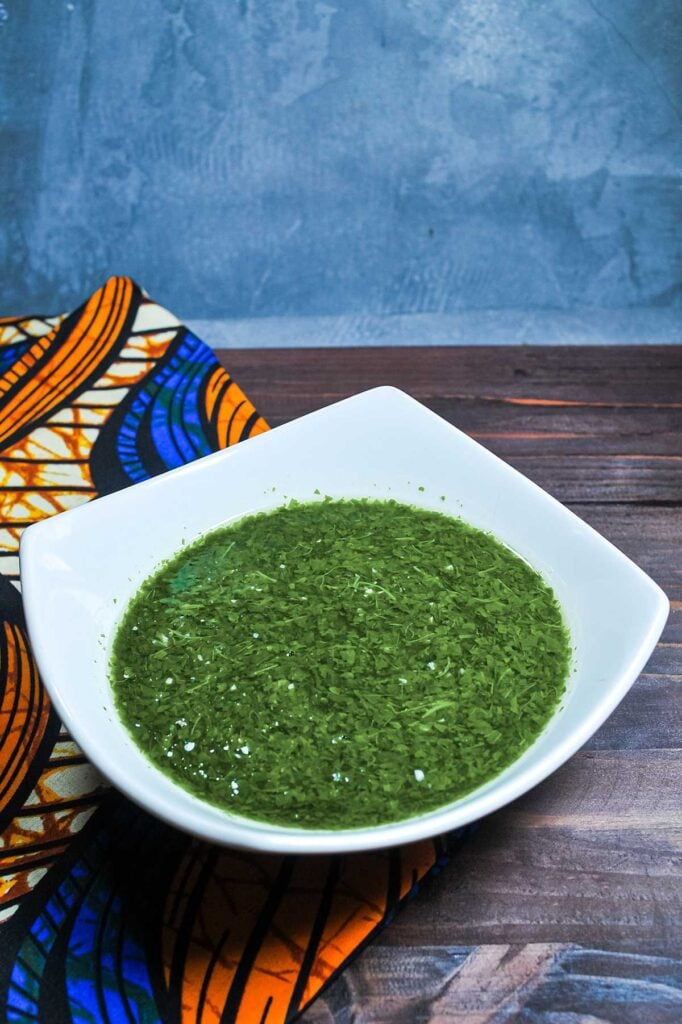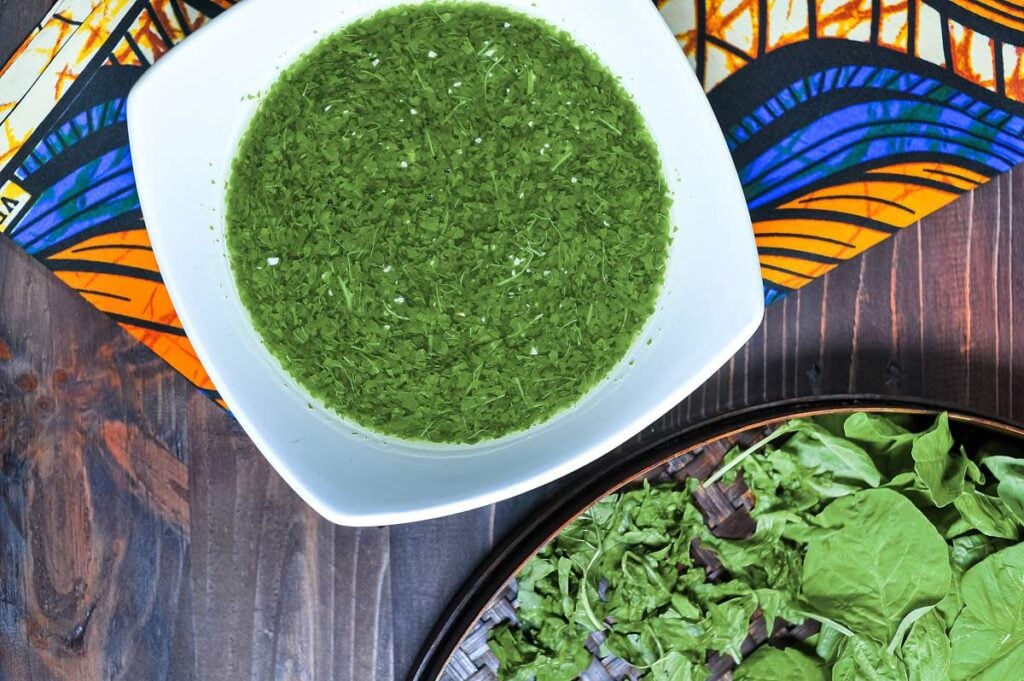Ewedu Soup, An Unbelievably Delicious And Easy-To-Make Recipe
Ewedu soup is a delicious herbaceous, colorful, filling, and flavor-packed African dish. It is easy to make and won’t take up your entire day. This soup is also a fantastic accompaniment to many other Nigerian dishes like swallows and other stews.
If you want to find more delicious traditional Nigerian recipes, go have a look on my site. I especially love serving Chin Chin or Oven Baked Jollof Rice.

What Is Ewedu Soup?
The main reason you may not have heard of this soup before is that it has many names. Jute leaves soup, Mulukhiyah, Molokhia, or Ewedu stew are only some popular ones. “Ewedu” in English is jute leaves, which refers to the main ingredient for this soup.
This soup is a traditional dish prepared by the Yoruba tribe in Nigeria. While it is rarely served on its own, it is a very colorful, filling, and flavor-packed soup.
Traditionally, this soup is served with other authentic Yoruba dishes like pounded yam, Fufu, or Eba. Gbegiri and Ewedu is another classic food pairing as well as Amala and Ewedu. Together, these create a colorful plate that is almost too pretty to eat!

About The Ingredients
Now, I realize that there may be many ingredients in today’s Ewedu recipe that you may not be familiar with. So, before we look at how to make Ewedu soup, we will look at the key ingredients for my recipe.
First, you need jute leaves. You can use fresh or frozen leaves – whatever is available to you. You can find them at your local market or at an Indian, Persian, African, or Caribbean grocer.
Then you need locust beans. If you don’t like particularly pungent ingredients, maybe leave this one out. But for me, it adds a deliciously rich and complex flavor. The beans also help thicken the consistency of the soup. This is the substitute for potash (a thickener).
Next, we have crayfish powder. This powder is relatively easy to find and there are even different textures. For my recipe, I like to use fine powder without any texture. It adds an umami flavor and mouth-watering smell.
And finally, you need some stock powder and salt. These should be used with a light hand because they can easily overpower the flavor of the soup.

How To Make Ewedu Soup With Frozen Leaves?
Fresh jute leaves may be difficult to find depending on where you are located in the world. That is why I also often make this recipe using frozen jute leaves.
To use frozen leaves, place them into a sieve. Then, leave them to defrost for a couple of hours. If you are in a hurry, add them to lukewarm water so they defrost in a few minutes. But, the flavor and texture of the leaves are much better when they are thawed slowly.
Once you thaw the leaves, you can follow the steps in my recipe below.
Tips And Tricks For Ewedu
- Make sure to rinse your fresh jute leaves very well. If they have any leftover grains of sand, you will taste them in your soup. The flavor will be muddy and the texture will be gritty.
- You don’t have to pre-cook the fresh jute leaves. But, it does help get a fantastic thick consistency. If you don’t have time, skip the pre-cooking and blend the washed leaves immediately.
- Don’t cook the leaves for too long. That will cause the soup to lose its thick consistency. It is especially important if you pre-cook the leaves. So, always keep an eye on your Ewedu soup.

FAQs
What does Ewedu soup taste like?
This soup is naturally herbaceous because you make it from mainly jute leaves. The seasoning ingredients added make it very savory and many describe it as being similar to spaghetti sauce. Personally, I don’t think this comparison is accurate, seeing as spaghetti sauce is tomato-like and often cheesy. The only way it could maybe be similar is when it comes to the savory herby flavors.
Is Ewedu safe to eat for diabetic people?
Ewedu soup is a great dish that will help manage your blood sugar levels. While there is no official research on this (that I could find at least), it could make sense. This recipe contains virtually no sugar so it wouldn’t affect people with diabetes much.
Is there a substitute for jute leaves?
This soup is best if you make it with jute leaves. However, because they could be hard to find, you can also use spinach. This alternative doesn’t taste like jute leaves. But, the consistency it will give and its earthy flavor will make it an acceptable swap. You may need to add a thickener like cornstarch to give the soup a similar slimy and thick consistency.
Are there any health benefits of Ewedu soup?
It is said that Ewedu soup is good for weight loss because of its low-calorie count. It could help fight stress and heart diseases, and potentially strengthen your immune system. While it is mostly used in traditional medicine, all ingredients do have some benefit to them.

More African recipes

Ewedu Soup, An Unbelievably Delicious And Easy-To-Make Recipe
Ingredients
- 16 ounces fresh Jute (Ewedu) leaves
- 2 cups water
- 2 tbsp locust beans, optional
- 2 tbsp ground crayfish powder
- 1 1/2 tsp chicken stock powder
- Salt, to taste
Instructions
- To start, prepare the fresh jute leaves. Pluck them off of the branch or stem one by one. Then, place them in a sieve and rinse them under cold running water. Make sure that all granules and sand are washed off.
- Next, drain the leaves from the water and place them directly into a large pot with the water. Allow them to simmer over medium heat for 5 minutes. This will soften the leaves so they blend more easily.
- Once they are soft, drain them and place them into the blender. Allow them to cool for a while. Add the locust bean ground crayfish powder. Blend the ingredients until you have a completely smooth and uniform mixture. You can add a bit of the boiled water to help create a smooth consistency.
- Add the seasoned blended mixture into a medium saucepan. Then, season the paste with the stock powder and salt. This is also when you may add any additional seasoning ingredients that you'd like. Cook the Ewedu over medium heat until it becomes completely smooth and thick. This takes about 3-5 minutes.
- Once cooked, serve your homemade fresh Ewedu soup immediately with some of your favorite accompaniments. Ewedu and Amala is a fantastic and traditional way to serve it.



